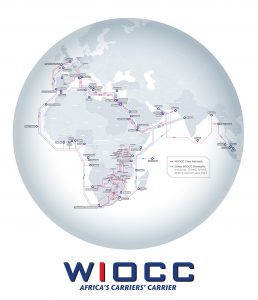Meeting the capacity demand challenge
“Eight years ago, a typical client requirement was for 155 Megabits per second; today, 100 Gigabits per second is not unusual”, says Chris Wood, CEO of leading capacity wholesaler WIOCC.
Increasing adoption of, and reliance upon, bandwidth-intensive applications by enterprise and domestic clients is driving capacity demand amongst operators – particularly those serving the banking and trading communities – content providers, Internet Service Providers (ISPs) and Wireless ISPs (WISPs), typically starting at 10Gbps, up to 100Gbps and beyond.
As well as delivery of the bandwidth itself, network latency, reliability and cost are all critical in the provision of connectivity. Achieving the required network scale, quality and reach demands a significant and sustained programme of investment in metropolitan, national and international infrastructure. For example, capacity wholesaler WIOCC has invested over US$300million in its unique network footprint, which is scaled to meet the ongoing capacity needs of even the most demanding of wholesale clients. The network comprises more than 55,000km of African terrestrial fibre linked seamlessly with capacity on multiple submarine cable systems, providing access to much of sub-Saharan African, including the ‘Golden Triangle’ of Nigeria, Kenya and South Africa.
Tailored service offerings for Africa

Addressing connectivity requirements in Africa can be complex, typically requiring interaction with multiple service providers. A simpler solution is to use an expert Africa supplier with the expertise and relationships to deliver end-to-end managed connectivity solutions – a single point of contact, one contract and one bill.
WIOCC is such an organization: a leading African carriers’ carrier focused on implementing tailored solutions for its wholesale client base. It is playing a key role in the arrival of international carriers, ISPs and over-the-top players into African markets, with these arrivals triggering a significant migration of content, principally from Europe to Africa, to improve service performance for consumers in Africa. With this has come the need for more localised services such as IP Transit, which provides ISPs with connectivity to global internet content.
WIOCC is also increasingly supporting client migration from legacy SDH networks to new-generation, high-capacity, low-delay Layer-0 Optical Transport Network (OTN) technologies and pure Ethernet at the Metro level, enabling seamless integration of international connectivity with extensive local presence.
Johannesburg/Pretoria Metro
With its 40-PoP Johannesburg/Pretoria Metro, extensive South African network and strategic investments in international submarine cables, WIOCC enables ISPs, WISPs and operators to address the needs of enterprise clients in Jo’burg and Pretoria seeking cost-effective, high-quality internet and point-to-point connectivity.

